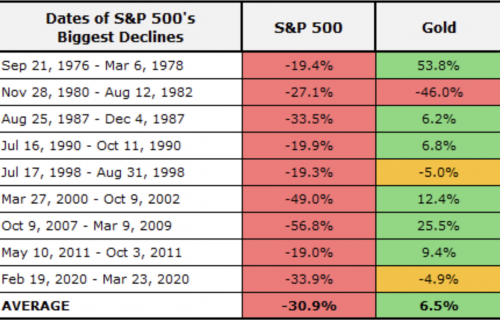- 01344 851250
Facebook
Twitter
Instagram
Linkedin

Gold’s Yin to the Stock Markets Yang

Do we have a Gold bubble?
Many people believe in the idea of a Gold bubble. A bubble occurs when the price of an asset quickly increases without any obvious reason or cause to suggest a higher value. The price of gold mainly rises simply just because people think it will. It is very hard to place the real value of Gold as it doesn’t directly yield income, which is why speculators increase the price of gold beyond its intrinsic value, resulting in the gold bubble.
The price of gold can fall, however it is very unlikely that it will fall below the amount it costs to dig it out the ground and to bring it to the market. If in the unlikely event it does fall below these costs, the extraction of gold will rapidly slow down, increasing demand, which will push the prices back up again. This is why most financial advisors would use gold in their clients’ portfolios as it is seen as a safe asset and a good hedge against inflation, however there is no fundamental reason that it’s value should increase when the pound falls.
The effects of a stock market crash on gold
There are many questions from investors on when the best time to buy gold is, and if it can be used to weather the storm in a stock market crash.
The below table shows the performance of gold during the past stock market crashes.

Out of the 9 stocks market crash scenarios shown in the table, there was only one occurrence of gold falling more than the S&P, and more importantly 6 out of the 9 scenarios shows the value of gold increasing when the S&P is falling. The 2 yellow columns show that gold fell when the S&P fell, but at a lower rate, showing that is would’ve still been more beneficial for investors to be invested in gold.
The reason for this negative correlation between the performance of the S&P and gold is because when there is high levels of fear due to the stock market falling, investors tend to invest in gold as it is seen as a ‘safe haven’. Similarly, if the stock markets are performing exceptionally well, investors are more likely to take advantage of this opportunity and deflect their attention from investing in gold.
Should I invest in gold?
In the current climate with confidence in politics and the worldwide climate at an all-time low, gold can act as an important part of investments portfolios to help preserve wealth and possibly make a positive return in times when markets are falling. The gold market has the advantage of a high liquidity that allows investors to easily sell their gold for cash.
However, just like any other investment, it is important to consider the time frame you are looking to invest for, and the likelihood of you needing to access that money. It is essential to make sure your portfolio is diversified. Investing in gold can help to diversify a portfolio as when a market declines, the price of gold has historically increased.
Please note that these types of products are not suitable for all clients and that this should not be taken as personal advice. All investments can go up and down in value and therefore you could get back less than you invest. Past performance is not a guide to the future.
Written by: Jemma Long
12 July 2022
Contact Us
Facebook
Twitter
Instagram
Linkedin

Ascot Wealth Management Limited is authorised and regulated by the Financial Conduct Authority reference 551744. Our registered office: Scotch Corner, London Road, Sunningdale, Ascot, Berkshire, SL5 0ER. Registered in England No. 7428363. www.old.ascotwm.com Unless otherwise stated, the information in this document was valid on 3rd February 2017. Not all the services and investments described are regulated by the Financial Conduct Authority (FCA). Tax, trust and company administration services are not authorised and regulated by the Financial Conduct Authority. The services described may not be suitable for all and you should seek appropriate advice. This document is not intended as an offer or solicitation for the purpose or sale of any financial instrument by Ascot Wealth Management Limited. The information and opinions expressed herein are considered valid at publication, but are subject to change without notice and their accuracy and completeness cannot be guaranteed. No part of this document may be reproduced in any manner without prior permission. © 2017 Ascot Wealth Management Ltd. Please note: This website uses cookies. To continue to use this website, you are giving consent to cookies being used.
